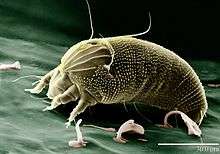mite
English
Etymology
From Middle English mite, from Old English mīte (“mite, tiny insect”), from Proto-Germanic *mītǭ (“biting insect”, literally “cutter”), from *maitaną (“to cut”), from Proto-Indo-European *mey- (“small”) or *mai- (“to cut”). Akin to Old High German mīza (“mite”), Middle Dutch mīte (“moth, mite”), Dutch mijt (“moth, mite”), Danish mide (“mite”).
Pronunciation
- (Received Pronunciation, General American) enPR: mīt, IPA(key): /maɪt/
Audio (GA) (file) - Rhymes: -aɪt
- Homophone: might
Noun
mite (plural mites)
- A minute arachnid, of the order Acarina, of which there are many species.
- A small coin formerly circulated in England, rated at about a third of a farthing.
- 1803, William Blake, Auguries of Innocence
- One mite wrung from the lab'rer's hands
- Shall buy and sell the miser's lands;
- 1803, William Blake, Auguries of Innocence
- A lepton, a small coin used in Palestine in the time of Christ.
- A small weight; one twentieth of a grain.
- (sometimes used adverbially) Anything very small; a minute object; a very little quantity or particle
- 1913, Joseph C[rosby] Lincoln, chapter V, in Mr. Pratt’s Patients, New York, N.Y.; London: D. Appleton and Company, OCLC 35623305, OL 5535161W; republished New York, N.Y.; London: D. Appleton and Company, 1914, OCLC 37141511, pages 124–125:
- "Well," I says, "I cal'late a body could get used to Tophet if he stayed there long enough." She flared up; the least mite of a slam at Doctor Wool was enough to set her going.
- 1956, Janice Holt Giles, chapter 8, in Hannah Fowler, Boston, Mass.: Houghton Mifflin, OCLC 937953041; republished Lexington, Ky.: University Press of Kentucky, 1992, →ISBN, page 69:
- "Silas, now," Esther Whitley had said, "would be a good one for you, Hannah. He's a mite on the old side, but he's steady, an' he's been wed before. He knows the ways of a woman better'n some."
- 1959, Frances Cavanah, Abe Lincoln Gets His Chance, Chicago, Ill.: Rand McNally, OCLC 1039439343; Abe Lincoln Gets His Chance (ReadHowYouWant Classics Library), EasyRead large edition, U.S.A.: ReadHowYouWant, 2008, →ISBN, page 30:
- Those trousers are a mite too big, but you'll soon grow into them.
-
- (colloquial, often used affectionately) A small or naughty person, or one you take pity on; rascal
- 2014, Lorraine F Elli, The Little Town Mouse
- “Tom told me that, but twasn't your fault, the little mite just couldn't wait to be born that's all.” A small smile played on Leah's lips
- 2014, Lorraine F Elli, The Little Town Mouse
Synonyms
- (small amount): see also Thesaurus:modicum.
Derived terms
- bee mite
- bird mite
- carpet mite
- cheese mite
- dust mite
- flour mite
- fruit mite
- harvest mite
- house mouse mite
- itch mite
- rust mite
- spider mite
- sugar mite
- trombiculid mite
- tropical rat mite
- widow's mite
Translations
|
|
Au
References
- transnewguinea.org, citing D. C. Laycock, Languages of the Lumi Subdistrict (West Sepik District), New Guinea (1968), Oceanic Linguistics, 7 (1): 36-66
Catalan
Further reading
- “mite” in Diccionari de la llengua catalana, segona edició, Institut d’Estudis Catalans.
French
Etymology
From Middle French, from Old French mitte (“kind of insect which gnaws on cloth or cheese”), from Middle Dutch mīte (“moth, mite”), ultimately from Proto-Germanic *mītǭ (“biting insect”, literally “cutter”), from *maitaną (“to cut”).
Akin to Old English mīte (“mite, tiny insect”), Old High German mīza (“mite”), Danish mide (“mite”).
Pronunciation
- IPA(key): /mit/
audio (file)
Noun
mite f (plural mites)
Derived terms
Verb
mite
Further reading
- “mite” in le Trésor de la langue française informatisé (The Digitized Treasury of the French Language).
Latin
Pronunciation
- (Classical) IPA(key): /ˈmiː.te/, [ˈmiː.tɛ]
Adjective
mīte
References
- mite in Charlton T. Lewis and Charles Short (1879) A Latin Dictionary, Oxford: Clarendon Press
- mite in Charlton T. Lewis (1891) An Elementary Latin Dictionary, New York: Harper & Brothers
Norman
Etymology
From Old French mitte (“kind of insect which gnaws on cloth or cheese”), from Middle Dutch mīte (“moth, mite”), ultimately from Proto-Germanic *mītǭ (“biting insect”, literally “cutter”).
